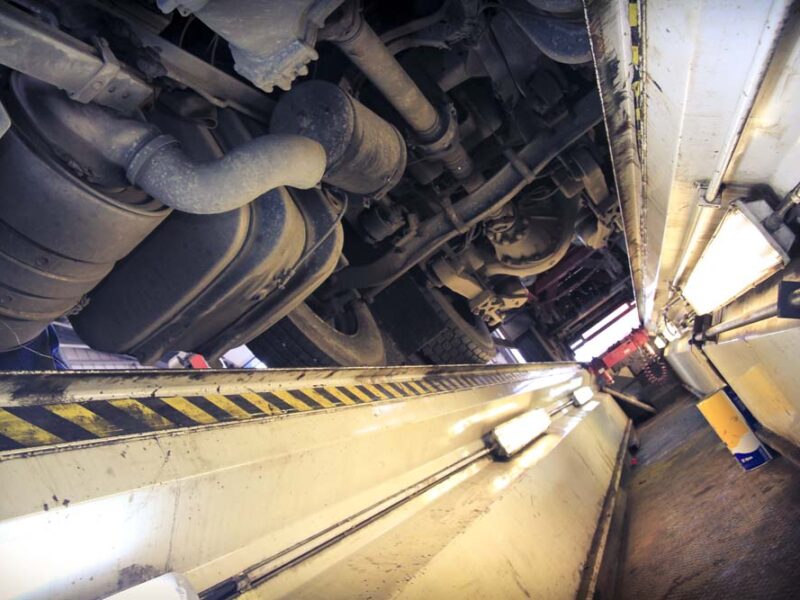Changes to the Clandestine Entrant Civil Penalty Scheme mean a Stitch in Time Really Does Save Nine!
In January 2023 the then Secretary of State for Immigration, Robert Jenrick made a statement to Parliament detailing the Government’s intentions to “crack down on illegal immigration….and to keep our borders safe and secure”. Updating the Clandestine Entrant Civil Penalty Scheme (CECPS) was the focus of this intention.
The CECPS has been in place for over 20 years and was established to supplement the provisions of the Immigration and Asylum Act 1999. It is designed to complement law enforcement activity against criminals who smuggle people into the UK illegally, as well as to deter those who decide to try to enter the country without permission. One of the key aspects of the scheme is to tackle “negligence by people who are not criminals but whose carelessness nonetheless means that they are responsible for a clandestine entrant gaining access to a vehicle”.
The Government ran a consultation on the effectiveness of the scheme in the summer of 2022 following evidence that in 2021-2022 there were nearly 4,000 incidents of clandestine entrants concealed in vehicles coming into the UK, up on the previous year’s numbers by 22%. In April 2023 the guidance on the CECPS was updated with the key change being the amount an operator and/or driver can be fined by way of a ‘civil penalty’ increasing from a maximum of £2,000.00 per clandestine entrant found in their vehicle to £10,000.00 per clandestine entrant. Given that both the operator and the driver of the vehicle that has been unlawfully entered into can be fined this top amount, that means that the bill for someone gaining access to a lorry (and it is usually lorries) is a whopping £20,000/entrant. It should be noted that the operator is responsible for paying both its own fine and its driver’s fine, if the driver fails to pay, if a clandestine entrant is found to be in a vehicle entering or leaving the UK.
New Penalty for Inadequate Securing of a Vehicle
The April 2023 amendment to the scheme also saw a new penalty introduced for a goods vehicle that is “not adequately secured” even if no clandestine entrant is found on the vehicle. The fine for that infraction is a maximum of £6,000.00 payable by the driver and the operator (making the total fine a maximum of £12,000.00 for each vehicle found to be inadequately secured) and is designed to ensure that all operators of goods vehicles going through UK borders are taking the need to deter the criminal people smuggler gangs very seriously. The Carriers’ Liability (amendment) Regulations 2023 set out the legal requirements and security standards expected by UK Border Force for owners, operators, hirers and drivers to adhere to when securing a vehicle.
Mitigation against any Fines Received
With the Government taking a zero-tolerance view of clandestine entrants, the only defence allowed against paying a fine is one where the driver can be proved to have acted ‘out of duress’ in allowing the illegal immigrants access to the vehicle. As most cases of clandestine entrants are ones where the driver of the vehicle was blissfully unaware of their extra cargo this is usually not a route that many operators can travel down. Therefore, the only other options to mitigate the level of the fine that is likely to be imposed or to extinguish the liability altogether is to prove that as an operator you have complied with the security regulations as set out in the government guidance.
It also helps to have signed up to be a member of the “Civil Penalty Accreditation Scheme” where the discount that may be applied to members fined under the CECPS is reduced by 50% from the maximum penalty starting point for each clandestine entrant found. The Government states that “those who run an effective [security] system are less likely to encounter incidents involving clandestine entrants”. The scheme is free to join and recognises operators who ensure they take appropriate actions to secure their vehicles and mitigate against the carriage of clandestine entrants.
How to Comply with UK Law on Clandestine Entrants
The UK Government has published a leaflet on how to try to prevent clandestine entrants from entering any vehicle that is being driven internationally. This includes details of what they recommend drivers and operators do if they suspect that there may be illegal immigrants on or in their vehicle as well as what to do if one is stopped by Border Force and found not to have a secured vehicle or to have clandestine entrants on or in the vehicle.
If in such an instance you, as an operator and your driver are fined, then letters will be sent from Border Force notifying you of the incident and asking for further information about the incident and your policies and procedures around this area in order for them to decide exactly how much of a fine to impose, if any. This is the time to instruct legal professionals to head off any penalty fine or begin to mitigate the amount that will be applied. Once a ‘Notice of Penalty’ is issued by Border Force there is then a period of just 28 days to serve a Notice of Objection. If no objections are served in time, then the fine must be paid within 60 days of the Notice of Penalty being made. So the clock starts ticking very quickly on whether a good result can be achieved.
The team at Pellys Transport & Regulatory Law have been dealing with clandestine entrant cases for over many years and have achieved very significant reductions on the amounts being fined. We also have experience of successfully dealing with vehicle impounding cases. So, if the worst happens then call us on 01279 818280 or click here to send an email. We are here to help.
© Richard Pelly – June 2024

Latest Coach & Bus Industry News and Insight

New Rules for Vehicle Operators and Drivers Carrying Out International Journeys
The Department for Transport and the Driver and Vehicle Standards Agency recently issued a bulletin regarding the new rules that vehicle operators and their drivers will have to comply with if travelling on international journeys…

Road Haulage Association Members and DVSA Leadership Work Shadow Each Other!
To help highlight the Road Haulage Association’s “National Lorry Week” which this year was between 4th and 8th November 2024, the Road Haulage Association and the DVSA’s Leadership team decided to spend some time work shadowing each other….

2024 Update to Guide to Maintaining Roadworthiness (GTMR)
The Guide to Maintaining Roadworthiness is the Driver & Vehicle Standard Agency’s (DVSA) standard produced in collaboration with key industry stake holders which explains the responsibilities and systems involved in maintaining vehicles in a roadworthy….

New Driver CPC Reforms to be in Force from 3rd December 2024
Following a very lengthy consultation period on this matter launched in early 2023, Parliament finally debated the “Vehicle Drivers (Certificates of Professional Competence) (Amendment) Regulations 2024” on Tuesday 29th October 2024…

When Sat Nav’s Lead Lorries Astray!
Lorries getting into trouble and causing chaos in the small country roads of Great Britain have been making headlines again. Whilst a lot of this content is amusing and no doubt is a winner with internet audiences there is a very serious side to these incidents…

Traffic Commissioners 2023-2024 Report – the Highlights & the Lowlights of the Year
In early October the Traffic Commissioners of Great Britain published their annual report. The report encompasses the purpose of the individual Traffic Commissioners who are independent regulators for the goods vehicle and public service vehicle industries and their professional drivers…

Vehicle Maintenance Data Collected by the DVSA
In a recent ‘blog’ by the DVSA’s Danny Charles the amount and type of data that the DVSA collects was discussed. Some may find it surprising how much data the DVSA holds and makes available to the general public on individual transport businesses…

Murky Mini-Bus Waters in UK?
There has been reports in the industry news concerning the number of illegal operators of mini bus services who are operating un-hindered by the regulatory enforcement agencies…

Driver CPC – Changes Coming in 2024 and 2025
The Driver Certificate of Professional Competence (DCPC) was introduced in the UK in 2007, as specified in EU Directive 2003/59/EC for all commercial drivers…

Driving in the UK? Read about the latest Rule Changes in 2024
Earlier this year various new driving laws were introduced, impacting both standard road users as well as HGV and PSV road users across England, Wales & Scotland. If you are driving in the UK, especially if you are a commercial driver, then you should ensure that you are aware of these amendments and new rules…

Are You Taking your Responsibilities to Maintain your Vehicles Seriously?
Running a haulage business is not an easy undertaking. There are a multitude of decisions to be made on a daily basis before any driver actually gets behind the wheel and delivers the goods (or passengers!).

Update to the Guide to Registering & Operating Local Bus Services in England & Wales
The Senior Traffic Commissioner’s guide to registering and operating local bus services in England and Wales is intended to help operators of local bus services understand the requirements for registering a service.
